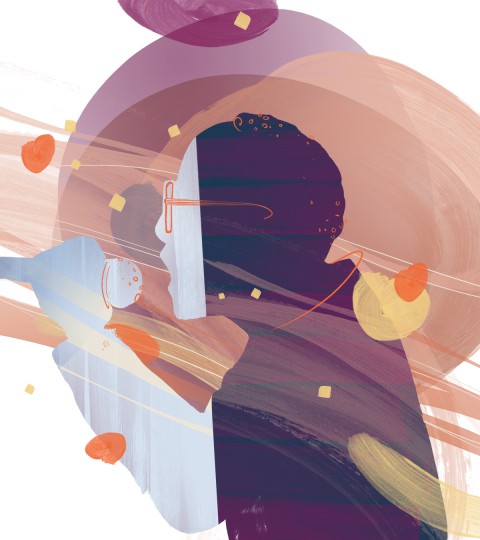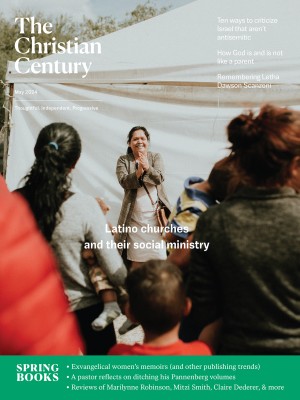Religiously fluid
Like a lot of Christian millennials, I don’t need Christianity to be everything for me.

(Illustration by Mary Haasdyk Vooys)
I remember the first time I realized I was fluid. I was new to Christianity, having spent the early part of adolescence as a Five Percenter—a Black radical religious group closely resembling the Nation of Islam—which I found by way of hip-hop, my first religion. My favorite emcees were Muslim (or some version of it), and it felt right for me: the emphasis on knowledge and discipline, the critique of empire, the lifting of Black consciousness, and the outright declaration that we were not subjects but in fact “gods” ourselves. I was sold.
After a while I found myself spell-broken—perhaps due more to the wandering of adolescence than anything else—and in a local church that was allowing kids to rap during its Monday night program. Like every kid I wanted to rap, but unlike most kids I could actually rap. The problem was, I didn’t have anywhere to go! So I guess we’re going to church then, was how my internal dialogue went. Yuck. White man’s Jesus and all of that. I had a real attitude about it.
Read our latest issue or browse back issues.
Turns out, it was pretty nice! I didn’t enjoy the syrupy Jesus stuff, but I was needing a little love and a place to feel seen. The pastors there were amazing, and I quickly became a formidable youth leader—in all the ways that “formidable” really means “annoying”—but a full-fledged evangelicalism never quite took. I enjoyed sex, for one. I also genuinely missed the emphasis on Black consciousness that felt so core to my identity. So while I was onstage rapping and being a Christian On Fire, I was for sure still reading the Qur’an, re-centering myself with prayer throughout the day, and struggling to reconcile any sort of organized religion with the racism that seemed so clearly embedded in it. To be honest, it felt like I was cheating on God.
It wasn’t until I got to Morehouse College—a place where being Black and having faith are usually part of the same sentence—that I found liberation theology and realized that there was a world where my religious fluidity was part of the status quo. We were all nones—not quite able to follow the God of our upbringing but not quite out the door altogether—and I felt alive studying Christianity and Islam and Buddhism. This felt like the size of a God I wanted to serve, even as I knew ultimately that pursuing a life after the ethics and love of Jesus of Nazareth was my North Star. I was and am a Christian, and once I found the church I was drawn to its sociological importance and even a bit of its foolishness. But I don’t need Christianity to be everything for me, and I don’t think God’s residence has only one address.
If you’re flinching at any of this—great!—I just gave you a personal narrative version of what many a Pew report has spit out as data. This is the faith life of many millennials. We might be in the church, but if we can find community at brunch, we might go there instead! We rock with Jesus, and we know that Jesus wouldn’t rock with how the church acts sometimes. We like communion, and we want to feel connected to nature and our bodies in ways that the liturgy doesn’t always make room for. And so while we may pray our grandmother’s prayers, we have decided, decidedly, that we will worship the gods of our ancestors with a bit more fluidity.
There is a documentary on faith among Black millennials called gOD-Talk, produced by the National Museum of African American History and Culture, and it describes this fluidity in devastating terms: stories of trans and queer folk ostracized, tales of people feeling “incomplete” or not fully embodied in their home church practices, and so they have found ways to multi-hyphenate their faith experience in ways that serve no one tradition fully.
And blame us perhaps for not working hard enough to “transform the system from within,” but we also do a pretty good job at finding what we need elsewhere. Why spend the energy trying to change the church’s recipe? Let’s just make a gumbo: a little of this and a little of that, sprinkle in some hip-hop, and we’re good!
Jokes and creole metaphors aside, I think what I’m describing is a deep cynicism toward fidelity that is a key marker of millennial life. Maybe we were exposed to too many options as children, maybe it’s the sugary cereals, or maybe it’s that we were the first generation to experience the collapse of institutions that were built for our thriving. College education, the government, media, marriage, real estate: we were raised to believe that these were essentially good and things to strive for and trust, only to watch them struggle mightily to operate or fulfill their promises with any integrity. (Add the church to this list.) Every generation has a moment when they watch the world fall. But when it happened to us—9/11 is a good roundabout date, but the aughts were generally atrocious—we didn’t recommit to these institutions afterward. We moved forward with loyal skepticism and a willingness to meet our needs in plurality.
In other words, pastors, don’t be offended: you aren’t the only ones. They are taking your Sunday guidance and motivating themselves on Mondays on Instagram; they are meditating Tuesday and seeing their therapist on Wednesday (who, by the way, they trust more than you); and the rest of the week they are doing what makes them feel alive. Do some of our decisions need critique? Of course. But instead of trusting the church to create the world where our best self can live, we are creating that world. What some may deem a lack of faith needs to be reconsidered. It’s fluid. And we pastors need to make room for it if we are going to better go alongside people in these times.






